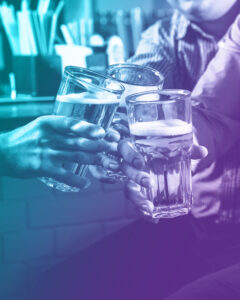Can Alcoholism Cause A Stroke
Your dad has always been a heavy drinker, often finishing a twelve pack of beer daily and drinking harder alcohol on the weekends. He always got up for work every day, paid the bills, and came to watch all of your soccer games. Drinking never really seemed to take away from his quality of life, so you never saw it as a concern.

Then, you get the phone call from your mom that you never thought you’d get: your dad is in the hospital. The doctors explain that your dad has had a stroke, and the likely cause was all the drinking over the years. Your dad is young, only 54, how could he have had a stroke? Was alcohol really the cause?
In 2019, 40% of Hillsborough County residents mentioned alcohol misuse as a risky behavior in their lives. Clean Recovery Centers understands that alcohol can seem like a solution to problems now, but the health effects will eventually become present. Our program has a wellness component to help create healthy habits and choices for both the mind and body. Today’s blog discusses the risk of alcoholism causing a stroke, and what to do if it happens.
Can Alcoholism Cause a Stroke?
A stroke occurs when blood flow in the brain is blocked or when a blood vessel bursts within the brain. There are different types of strokes and they can occur for different reasons:
Ischemic – occurs when blood flow in an artery leading to the brain becomes blocked. This type of stroke is the most common, and fatty deposits can also cause the narrowing of blood vessels, creating blockages.
Hemorrhagic – when an artery bursts or leaks. Blood leaking from the artery causes pressure to build in the brain, damaging the cells around the area. Most are associated with high blood pressure and aneurysms.
Transient ischemic attack (TIA) – often referred to as a mini-stroke. This happens when blood flow is blocked for a short amount of time, often 5 minutes or less. TIAs are warning signs that a major stroke can occur at any time.
Alcoholism can cause a stroke because it changes the way blood flows in the blood vessels. When alcohol enters the body, the blood vessels narrow. This makes it harder for the heart to pump blood throughout the body, especially to key areas like the brain.
What Factors Can Lead to a Stroke Caused by Alcoholism?
There are many factors that can contribute to alcoholism causing a stroke. Some of these include:
- Being overweight
- Having other conditions such as diabetes or high blood pressure
- History of heart disease or cardiovascular problems
- Family history of strokes or heart attacks
- Taking certain medications such as anticoagulants
While having any of these risk factors does not guarantee having a stroke, drinking alcohol with them will increase the chances. Alcohol can raise blood pressure even if you don’t already have high blood pressure, which also increases the risk of having a stroke. If you or someone you love is showing symptoms of alcoholism, it may be time to have a discussion about treatment.
Alcoholism and the Heart
Despite strokes occurring in the brain, they are typically the result of heart problems. Alcohol causes an irregular heartbeat, known as atrial fibrillation. This type of irregular rhythm increases the chance of blood clots. The heart pumps the clots throughout the system, where they can end up in the brain and cause a stroke.
Alcoholic cardiomyopathy is a condition in which the heart muscle has become weakened by chronic alcohol use. This weakening makes it difficult for the heart to properly pump blood through the body and also causes a build-up of fat in the muscles. Continued alcohol use can cause the damage done to the heart to be permanent, and increases the likelihood of a future stroke. However, because this type of cardiomyopathy has an outside cause, it is possible to reverse the damage if it has not become too profound – alcohol use must stop for this to happen.
Alcoholism’s Effect on Brain Functions
 Blackouts during binge drinking sessions are common, especially when they progress to alcohol poisoning. This is because alcohol affects the hippocampus region of the brain. Memory creation and storage occur in this area, and alcohol interferes with its ability to function properly. The cerebellum controls gait, and alcohol impairs this function as well. Poor coordination is the result, leading to potential falls and injuries.
Blackouts during binge drinking sessions are common, especially when they progress to alcohol poisoning. This is because alcohol affects the hippocampus region of the brain. Memory creation and storage occur in this area, and alcohol interferes with its ability to function properly. The cerebellum controls gait, and alcohol impairs this function as well. Poor coordination is the result, leading to potential falls and injuries.
Long-term alcohol use can also cause damage to areas of the brain that may be irreversible. Wet brain syndrome and alcohol-induced dementia can affect memory and motor functions, and if left untreated, these functions will not be regained.
Alcoholism Affecting the Cardiovascular System
As we mentioned, alcohol causes the heart to become damaged, which leads to the formation of blood clots. While in the past it was studied that moderate alcohol use could help prevent coronary artery disease, it has been proven that heavy drinking causes high blood pressure and prolonged stress on the arteries. The cardiovascular system includes the heart but also the arteries and veins transporting the blood. When they cannot function properly, the risk of blood clots and strokes increases.
How Does Alcoholism Cause a Stroke?
Alcohol can cause both ischemic and hemorrhagic strokes to occur. If a blood clot forms in the heart from excess alcohol use, an ischemic stroke can happen at any time. However, in the case of weakened arteries and blood vessels, a hemorrhagic stroke is more likely. Both types of strokes are serious medical emergencies and should be treated immediately. Ischemic strokes do have a higher chance of survival as hemorrhagic strokes cause damage to brain cells and an increase in pressure on the brain.
What Are the Symptoms of an Alcohol-Induced Stroke?
There are key symptoms to look for in a suspected stroke, and they can be remembered by the acronym F.A.S.T. This stands for:
Face – one side of the face will start drooping. The person will not be able to lift it with their facial muscles
Arms – have the person raise both arms. If one arm drops and they are unable to raise it back up, a potential stroke is happening
Speech – the person will have difficulty speaking clearly
Time – the longer the brain is deprived of blood, the more damage can occur. If the first symptom/s are seen, it is time to call for help immediately.
How Can I Reduce My Risk of an Alcohol-Induced Stroke?
Reducing the risk of stroke involves eating a healthy diet, exercising regularly, maintaining a healthy weight, and limiting alcohol use. Moderate drinking is described as one drink or less per day for women and two drinks or less per day for men. However, if you have a risk factor for strokes already, it is best to refrain from alcohol altogether.
Worried About an Alcohol-Induced Stroke? It May Be Time to Get Treatment for Alcohol Use Disorder in Florida
Managing an alcohol use disorder can feel like a ticking time bomb. The good news is that the damage done to the body may be reversible, and all you have to do is take the first step. Finding a detoxification for alcohol that has a full treatment program can help you retake your life and heal your body and mind. Don’t wait until it is too late, it will be the most rewarding experience you can give yourself.
A stroke can occur at any time from alcohol, which is why now is the time to seek help. Clean Recovery Centers has locations across the Suncoast, and each facility has a certified rapid-resolution therapist onsite. This type of therapy addresses past traumas and gets to the root causes of addiction. Call us today at (888) 330-2532 to learn more about our alcohol use disorder program.
FAQS
How much alcohol needs to be consumed to cause a stroke?
Heavy drinking for prolonged periods can cause a stroke to occur. This is 15 or more drinks per week for men and 8 or more drinks per week for women.
What kind of brain damage does alcoholism cause?
Alcoholism can cause brain damage in any region. Alcohol causes nerve cells to die, leading to brain shrinkage and fewer cells being able to carry messages throughout the body.
Can binge drinking lead to a stroke?
Frequent binge drinking can lead to a stroke. Binge drinking is defined as 5 or more drinks in one sitting for men and 4 or more drinks in one sitting for women.


